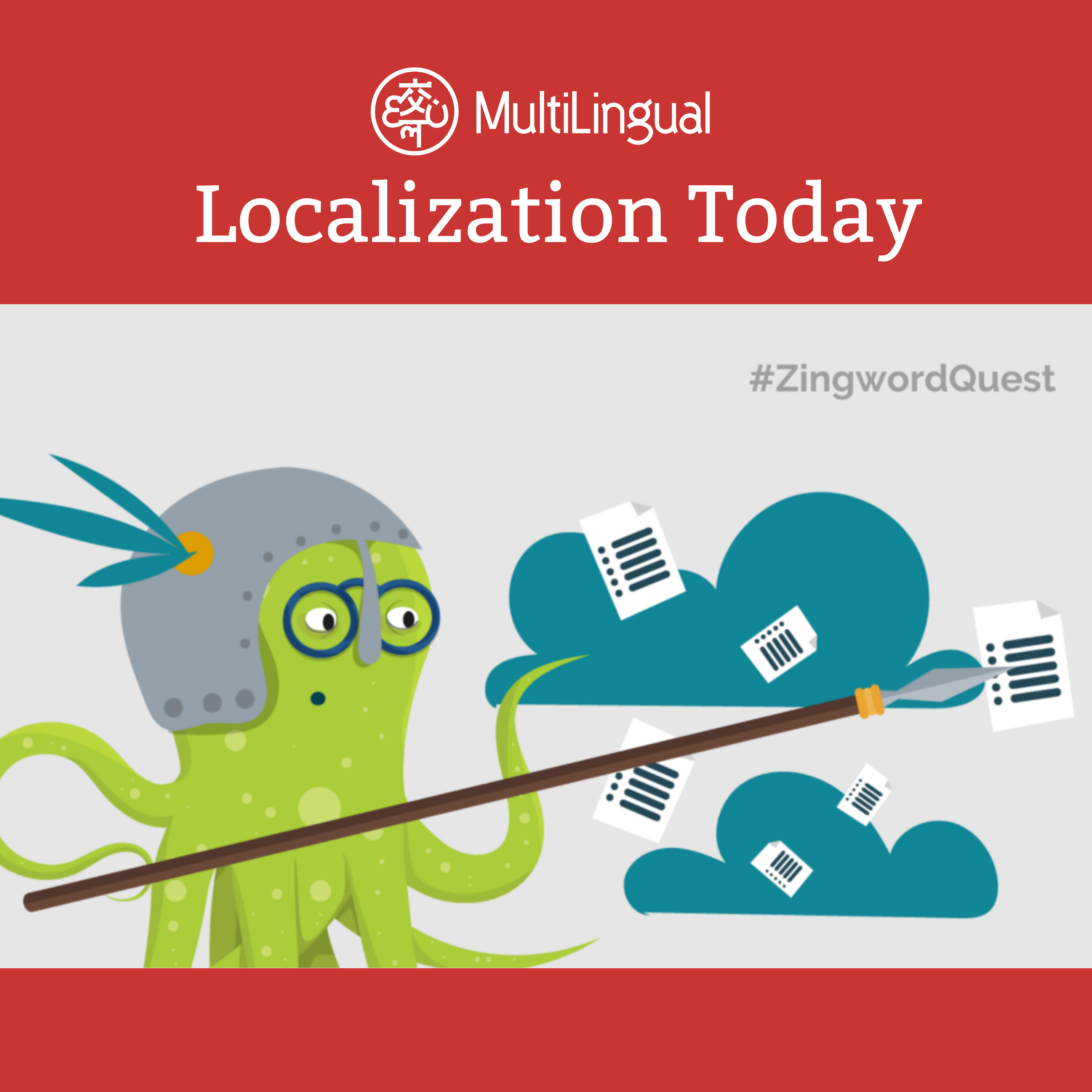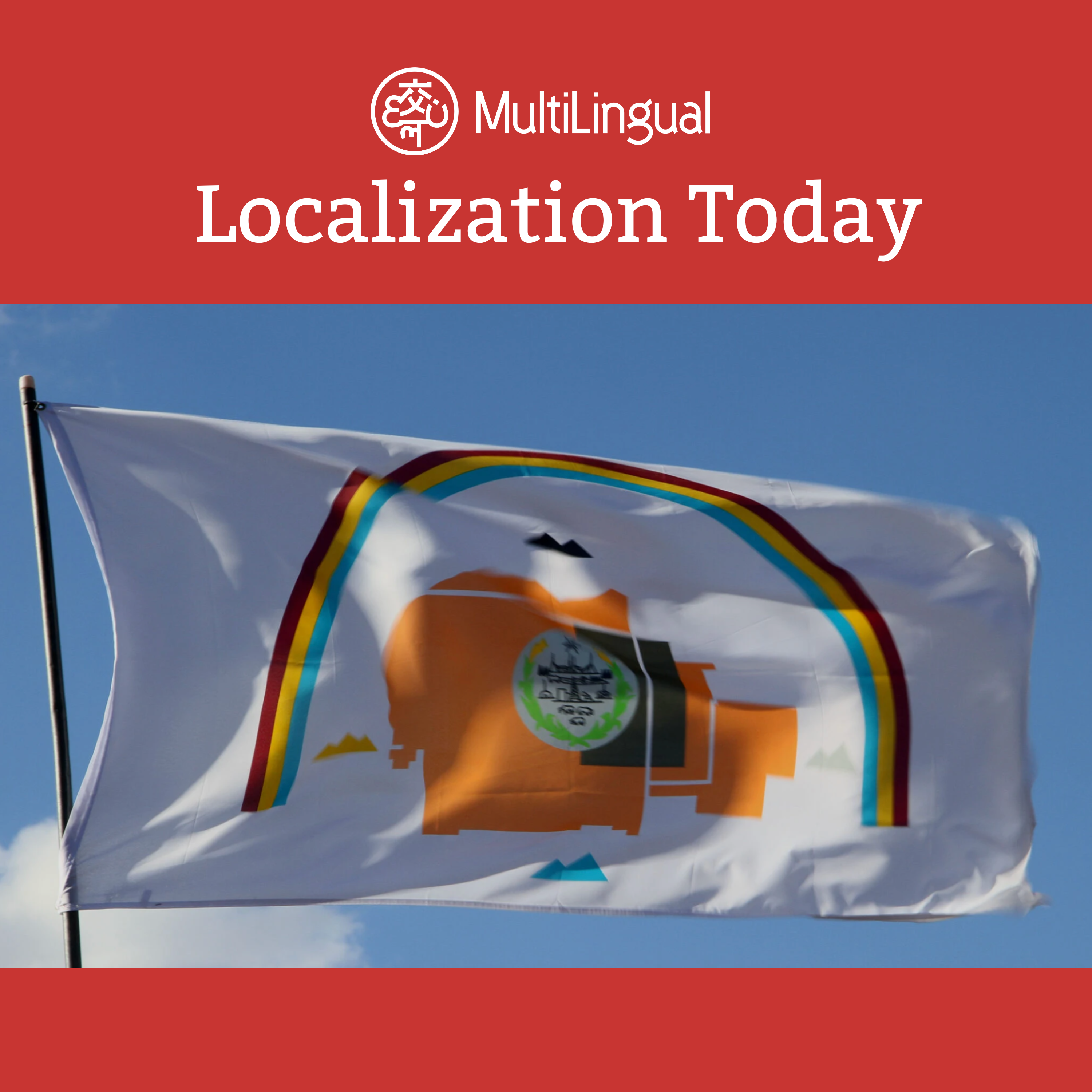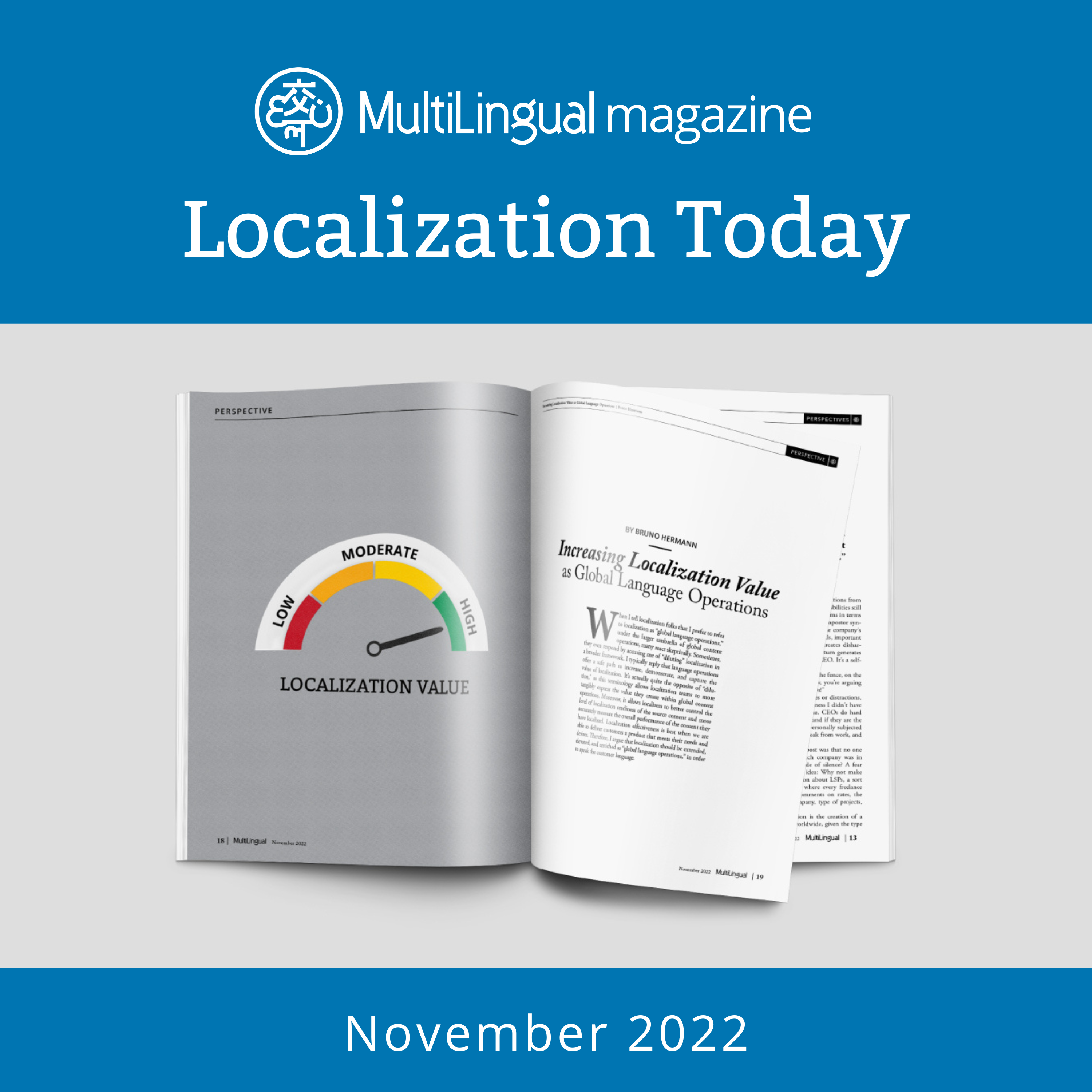Episode Transcript
[00:00:06] Speaker A: Hello and welcome to Localization Today. My name is Eddie Arrieta, CEO here at Multilingual Media. We are in the context of GALA 2025 in wonderful Montreal, Canada today, joined by the also wonderful Viviana Vernave, head of Interpretation and accessibility at WeLocalize. I should have said accessibility and interpretation to go with your, with your title. Viviana, thank you so much for joining us today.
[00:00:34] Speaker B: Thank you, Eddie. I'm happy to be here.
[00:00:43] Speaker A: And it's of course fantastic to go over some of the things that have happened already. At the event yesterday, April 13, we were talking about interpreting and technologies. We're talking about the future of interpretation, a gamified approach to industry challenges. And this is part of the special interest groups here at gala. Could you tell us a little bit more about this special interest group? When did it form and what's happening around that?
[00:01:12] Speaker B: Sure. I'm not sure when it formed, but I joined about a few years ago. I don't have a timeline now. Everything is one giant timeline. But I joined shortly after the San Diego gala and I took over the moderating with Aki Hayashi from Dell later that year.
And we've.
Our goal primarily is to bring together other stakeholders, providers, interpreters, buyers and everything else in between who are associated with providing interpreting or real time solutions, whether it's CART captions, spoken sign language, anything to do with real time language access.
And one thing I'm going to divert a little bit, but one thing we see with localization and globalization is there's a tight community where, which kind of exists, but not really with interpretation.
And our goal has been kind of getting everyone speaking together to grow our industry to better for the future of the next generation of interpreters, interpreting coordinators, project managers, event people, professionals, and kind of building the community that the localization side has built and mirroring that for interpretation.
[00:02:52] Speaker A: Thank you. And of course, in the session yesterday, which I participated on, we had a very interesting exercise. We were looking at ideal use cases. What were some of the things that we perhaps needed. And it tells us a little bit about the future of interpretation. Tell us about the exercise itself when you were building it.
What was the team thinking around that exercise? Why did you decide on going with that exercise in particular?
[00:03:20] Speaker B: Sure. One of the, I think reasons we see mixed participation or sometimes lack of participation in the SIG itself is a lot of it tends to be very focused on conference interpreting and technology providers. So we know that the GALA conference offers an opportunity for, to, for us to touch base with either other GALA members that don't participate in the SIG or potential future gala members who don't know that there's a space for them to contribute. So we know this was going to be a more diverse audience than our regular SIG meetings where we can if engage others who haven't really either utilized AI in their day to day are, are curious, but don't know where to start or just an audience. We don't usually have contact with like a lot of public sector representatives, interpreter interpreters themselves or interpreter representatives that really just for one reason or another we don't see as often in our monthly meetings.
[00:04:35] Speaker A: And of course part of the exercise brought in a lot of different conclusions, a lot of different needs and that was really interesting. Before we get onto that, one of the things that I quickly realized is that of course there is interpretation that that's non regulatory critical, I guess, or it's not very heavy on regulation.
It's not regulation heavy. And then you have interpretation that would be nice to have. Right. But we don't have it yet. And it seemed to me that it's a similar case to when nobody translated websites because nobody could do it. And now where some companies don't even know that their website is actually translated automatically into many different languages. Could you tell us a little bit about this particularity of interpretation where regulation is needed and perhaps humans will continue to do that for centuries to come and other places where interpretation is almost like a nice to have and actually a great enabler for more interpretation to have a more translated to happen as well.
[00:05:46] Speaker B: Yeah, I mean starting with where it's going to be with humans for, for a little bit longer is like you said, anything that's a regulated space, anything that could affect a person's life or quality of life. Right.
We think we put ourselves in, in those shoes of a potential user. Or maybe when we're traveling.
Eddie, if you go to Russia, are you okay with if you accidentally get caught up in the wrong spot having AI be your interpreter with the police or not that this would happen? Of course, but. Or if you end up, you have an accident in this situation, would you be okay with a surgeon saying, Eddie, we need to do this, this and this. Do you consent? If you feel comfortable with it, then I guess maybe that's when you would say, okay, I would feel comfortable in this. Let me propose this to my client or to my stakeholders, or maybe even more severe, would you put your mother in that situation?
And maybe some of us consider a second or third time whether it's an Appropriate fit. But anything where it affects a human's life or quality of life is where we want to think a little bit more. Anything with high risk, we generally don't want to.
We want to apply something human that would have that emotional intelligence, that would have be able to read between the lines and maybe in some cases convey the necessary message in a way that's more appropriate than a machine would.
[00:07:36] Speaker A: And this reading between the lines and these culturalization elements, they're very personal. We also talked about this, almost saying jokingly, interpreters also make mistakes. And depending on your level of training, you know you are more prone to mistakes than others.
Of course the humans in the loop then become very important. So even if you're training models, will we or do you see a world where interpreters continue interpreting because they will need to forever continue training models? Because the models that have been trained so far are trained with interpreting data that perhaps have those mistakes from humans that we are talking about. So could you tell us a little bit about how you see the humans within all these loops, within these training spaces and within interpretation with the use of technology? How do you think humans are adapting and what are they going to be doing in the future?
[00:08:36] Speaker B: Similar to what we saw with machine translation for written content, there's always going to be an element even regardless of content.
There's a lot of ask now in the meeting and events space where you know, here we we're having to choose between 2, 3 simultaneous tracks. Where do we go? But if you want to attend two, but you can only be in one place at once. Maybe you want to watch the video on demand later. So there's opportunity for, you know, editing content or flagging content in real time for that to be available for your consumption same day or next day.
There's opportunity for, like you said, continuing to train models, pronunciation guides. We see this a lot with pre recorded content for multimedia and elearning as well. So there's a lot of overlap in that AV space.
Again going back to more sensitive secure content. There's going to be a lot of people who are not comfortable with using AI for security concerns. Where does. We've heard this a lot today across the board is who owns the content.
Especially for using free or low cost tools. There's a big risk for with security potential ethics implications.
And then I'm going to shamelessly plug the accessibility side where in some of the regulations including you know, we have European Accessibility act coming up and EN 301549 some of the adopted versions have Wording that says there must be a human in the loop for any translations written, spoken or signed to guarantee proper access at a high quality to the end users.
[00:10:32] Speaker A: And tomorrow you have a presentation.
[00:10:35] Speaker B: We do. So I don't want to share too many things on.
[00:10:37] Speaker A: Of course not. This will be shared later. Probably this won't be shared tomorrow or before as the recording will need to be edited, but it's called From Boots to Bites. Has technology taken over for the interpreters? It reminds me that title a lot about the conversations that we had yesterday and some of the takeaways from that session. What do you think were the main takeaways from the session yesterday? And how does that inform your presentation tomorrow?
[00:11:04] Speaker B: Yeah, so yesterday we were very surprised and very pleased to see that there was a diverse group. Like I mentioned, we had people who, who come from the public and private sectors, from buyer side, from provider side.
Just general knowledge learning, which is, you know, we expect a lot of that at these conferences from different modalities of interpreting. We saw practitioners of machine interpreting, of rsi, tech, opi, VRI on demand, both consecutive simultaneous. Everyone was in the room, which was nice. We saw a lot of people who are concerned about not having access to the interpreters and what we hear sometimes. I'm not sure if this came up in your group, but we also know that this is an area where similar to translation, interpreters don't know if there's a future for them. So there will have to be some kind of technology to fill the gaps eventually. When you have the early adopters, mainly in the tech sector, once everyone starts seeing that, when they attend a conference or when they see it online or whatever it is, there will be curiosity and they'll be asking their stakeholders, their companies, hey, I saw this tool, can we implement it? And then people like us have to say, well, yes, but no, but here's when it's okay. We'll talk about that tomorrow in the booth. To bites on when it's appropriate, how do we determine it's appropriate, how do we identify which tools fit where and when? And then ultimately it's our responsibility to set expectations with our buyers and so they know what the limitations are, what they have to relate to their stakeholders and ultimately the consumers of whatever type of interpreting they're receiving.
[00:13:07] Speaker A: Which camp are you on? Are you on? There is going to be much more interpretation camp in the future and technology will enable us to do much more interpretation. Or are you on? The other camp of interpretation is going to be this. Well, I guess there are Many camps, but this one that says, well, we're going to continue interpreting the same things we're interpreting right now and technology is just going to replace humans. Probably a truth is somewhere in between.
[00:13:33] Speaker B: The truth is somewhere in between. You're right. I think we will continue to interpret, but we will see more adoption of AI. We'll go over the trends on tomorrow. But I mean, as a sneak preview, you know, we've seen clients slowly adopt and year over year you see it little by little adopt more and more. But they're also taking that spend and they're not getting rid of it. They're just adding more and saying, hey, new stakeholder group, guess what, I have budget to support you now. Or we say, hey, last time you only were able to do Japanese and Korean. I know you wanted to touch slat and market. We don't even know if they're going to use it. Let's use AI for this one and then we can see, see, we can give you the data, the utilization. If they used it, you can decide, ask your users, was this good enough? Or maybe we hire human interpreters for the next one. But the nice thing is we have so much data now and customers want that. Customers want to know, what is my utilization? Am I getting the ROI that I paid a few thousand dollars for per language?
And ultimately that's going to drive it. But at the end of the day, the core service that we're promoting is just giving people an option to hear and learn in their language and then we tweak around there. Granted, a lot of my perspective comes from private sector work. I am not working in a lot of life and death situations, fortunately and unfortunately because they don't have as much experience there. But I'm in the camp of mix and match. Use the tools to gather data and to build your globalization strategy that includes spoken and sign language.
[00:15:25] Speaker A: All right, and just as a final note, and in light of what you just mentioned, what would be your message to interpreters out there and members of language access community that are thinking about all these things?
[00:15:37] Speaker B: Yeah, we already see a finite number of resources available.
Even with without an integrating AI, there will always be work for interpreters.
And like with any job, it's fine. Tune your gr, your craft, evolve, learn to use the tools.
You can use something like the ASR tools just as a guide for yourself to see event teams don't always provide a transcript or a teleprompter. AI tools can support here even if we're not using it for the wider audience. But there's a lot of opportunity for linguists to. To shift and grow with the tools to contribute to that growth.
Yeah, I'm excited. It's very similar to every part of our industry.
Adapt with the tools and find a new niche for yourself and get ahead of the curve to create a future for yourself.
[00:16:55] Speaker A: And this was our conversation with Viviana Bernave, head of Accessibility and interpretation at WeLocalize. We did talk about interpretation, interpreters, and the places where technology actually makes sense to be included and even replace humans. I hope you enjoyed this conversation as much as we did. My name is Eddie Arrieta, CEO here at Multilingual Media. Until next time.


